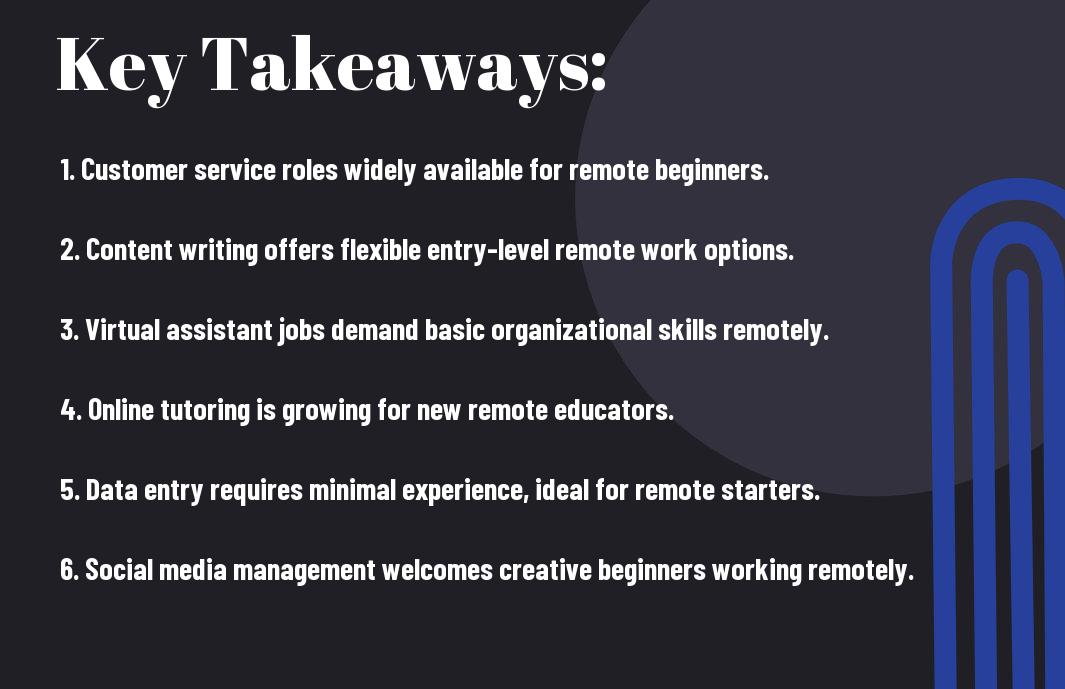Remote work has transformed the way you approach employment, offering flexibility and a variety of opportunities right from your home. As we move into 2025, it’s crucial to explore the best entry-level remote jobs that can jumpstart your career. This guide will introduce you to promising job options, the skills you may need to develop, and how to position yourself in the growing remote workforce. Whether you’re seeking a full-time role or a side gig, there’s something for everyone in the evolving landscape of remote work.
Key Takeaways:
- Many industries are increasingly adopting remote work settings, creating new opportunities for beginners in fields like customer service, data entry, and virtual assistance.
- Freelancing platforms will continue to grow, offering a variety of gigs that can help beginners build their skills and portfolios while earning money from home.
- Online courses and certifications are becoming more accessible, enabling beginners to gain valuable skills that are in high demand for remote positions.
- Networking through social media and professional online communities can help beginners discover job openings and connect with potential employers.
- Employers are prioritizing candidates who exhibit adaptability and strong communication skills, making these traits necessary for beginners entering the remote job market.

The Rise of Remote Work: Trends Shaping 2025
The continued evolution of remote work in 2025 is being shaped by a blend of technological advancements, shifting employment models, and changing worker expectations. Companies are increasingly recognizing the benefits of diverse talent pools and a more adaptable workforce. This shift allows individuals from varied backgrounds and skill sets to thrive, ultimately enriching corporate culture and productivity. By understanding these trends, you can better position yourself to take advantage of the myriad opportunities that remote work offers.
Shifts in Employment Models
Businesses are embracing flexible employment models, moving away from traditional 9-to-5 roles toward project-based and freelance opportunities. This encompasses options like contract work or gig economy jobs that cater to your specific skills. For you, this means a wider range of possibilities to align your interests with your career while potentially enjoying increased autonomy and work-life balance.
Technological Advancements and Their Impact
The rapid advancement of technology continues to redefine remote work by enhancing communication and collaboration capabilities. Tools like AI-driven platforms, virtual reality workspaces, and advanced project management software allow teams to coordinate seamlessly across distances. As these tools evolve, you’ll benefit from greater efficiencies and improved connectivity, fostering a more innovative and engaging work environment.
With the advent of AI and automation, your role in the workplace will likely shift, unlocking new efficiencies while simplifying your tasks. For example, AI now helps in data analysis and customer service, leading to reduced workloads for employees. Furthermore, platforms like Slack or Microsoft Teams have become integral in maintaining team cohesion and collaboration no matter where you are. As these technologies continue to develop, they offer you the chance to work more effectively, freeing up time for creativity and strategic thinking in your job. Embracing these changes will not only enhance your skill set but also increase your value in a competitive job market.
Top Remote Job Categories for New Entrants
Exploring the best remote job categories for beginners can lead you to numerous exciting opportunities in 2025. With industries rapidly adapting to the remote work landscape, you can find roles that match your skills and interests. From digital marketing to customer support and freelance content creation, there are many paths available. For a comprehensive list of companies currently hiring remotely, check out this resource on 50 Companies Now Hiring Remote Jobs In 2025.
Digital Marketing Roles
Digital marketing has emerged as a versatile field that welcomes beginners, offering a range of roles from social media management to SEO optimization. Many companies seek fresh talent to help them navigate their online presence. You can kickstart your career through virtual internships or entry-level positions that permit you to hone your skills while contributing to meaningful projects.
Customer Support Opportunities
Customer support roles are necessary in today’s mission-driven companies, creating pathways for individuals looking to start their remote careers. These positions often entail engaging with customers through chat, email, or phone to address inquiries and resolve issues. The demand for empathetic communicators means you’ll find ample opportunities to nurture your career from the comfort of your home.
Engaging directly with customers allows you to develop invaluable skills, such as problem-solving and interpersonal communication. Many organizations offer comprehensive training programs to guide you, ensuring you feel equipped to handle diverse customer needs. This sector not only aids in gaining crucial experience, but also serves as a stepping stone to more advanced positions in sales or account management.
Freelance Content Creation
Freelance content creation caters to those with a passion for writing, design, or multimedia production. This job category encourages creativity and independence, allowing you to work on projects that resonate with your interests. Various platforms act as intermediaries connecting freelancers with clients seeking specific content, giving you a chance to build your portfolio.
By venturing into freelance content creation, you can choose projects that align with your strengths, ultimately shaping your career trajectory. With the flexibility to set your schedule and work remotely, this field helps you establish a work-life balance while exploring diverse niches, making it an attractive option for beginners eager to showcase their talents and boost their income.
Skills in Demand: Preparing for the Remote Workspace
As remote work continues to flourish, certain skills have risen to prominence, ensuring your readiness for the evolving landscape. Companies increasingly seek candidates with proficiency in tools like Zoom and Slack for communication, while familiarity with project management software such as Trello or Asana can set you apart. Diving into The Top 9 Remote Work Platforms for 2025 will help you discover platforms that prioritize these vital skills. As a beginner, aligning your skillset with industry demand can greatly enhance your job prospects.
Essential Soft Skills for Success
Soft skills play a vital role in the remote workspace, where self-motivation, adaptability, and strong communication are prized. Being able to express ideas clearly and collaborate with diverse teams, despite physical distances, can significantly enhance your effectiveness. Emotional intelligence further aids in building rapport with colleagues, ensuring smooth interactions. Fostering these skills will not only help you secure a position but will also allow you to thrive in a remote environment.
Technical Skills That Set Beginners Apart
In an increasingly digital world, technical skills differentiate candidates in the remote job market. Proficiency in data analysis tools like Excel or Google Analytics can make your profile stand out. Additionally, basic coding knowledge or graphic design skills can significantly broaden your opportunities. Understanding content management systems (CMS) like WordPress can also provide an edge in roles related to content creation and management.
Familiarity with cloud-based applications (such as Google Workspace or Microsoft 365) is vital, as these facilitate collaboration and efficient information sharing. Knowledge of basic cybersecurity practices helps you navigate and protect sensitive data in a remote setting. Upskilling in these areas amplifies your employability, giving you a competitive edge over others, especially beginners. Investing time in online courses or webinars can prove invaluable in mastering these technical competencies.
Navigating Job Platforms: Where to Find Opportunities
Discovering the right remote work opportunities starts with knowing where to search. Navigating various job platforms can greatly enhance your chances of landing a position that fits your skills and interests. Evaluate not only mainstream job boards but also niche platforms that focus specifically on remote work. Each platform offers unique listings and features, so consider diversifying your search to increase your visibility in the remote job market.
Best Websites for Remote Job Searches
Several websites cater specifically to remote job seekers, such as FlexJobs, We Work Remotely, and Remote.co. FlexJobs offers a curated list of remote jobs across numerous industries, while We Work Remotely boasts a vast selection of job postings focused on tech and customer service. Remote.co features remote job listings, along with insights on remote work culture, making it a valuable resource for beginners looking to adapt to this new landscape.
Leveraging Social Media for Networking and Job Leads
Social media can be a powerful tool in your job search arsenal. Platforms like LinkedIn, Twitter, and Facebook groups dedicated to remote work are ideal for connecting with industry professionals and discovering job openings. By engaging with posts, joining discussions, and sharing relevant content, you can increase your visibility and demonstrate your expertise, attracting potential employers who seek talented individuals like you.
Engaging actively on LinkedIn allows you to network with industry peers, join groups relevant to your career interests, and even follow companies that have a remote work culture. Twitter is great for real-time job updates and following recruiters. Consider participating in Twitter chats or utilizing hashtags like #remotejobs and #jobsearch to connect with others. Facebook groups are also invaluable, as many remote teams post job opportunities there, creating a community-driven space for job seekers like yourself to thrive.
Overcoming Common Challenges for Beginners in Remote Work
Many beginners face challenges while adapting to remote work. Common issues include time management, feelings of isolation, and maintaining motivation. Successfully addressing these challenges can help you thrive in a remote environment and enhance your productivity. Developing effective strategies is key, so take the time to learn and grow through this unique work experience.
Time Management Tips for Remote Workers
Mastering time management can drastically improve your remote work experience. To stay organized and on task, consider these tips:
- Establish a consistent work schedule.
- Utilize digital planners or time-blocking techniques.
- Set daily goals to monitor your progress.
- Take regular breaks to recharge and maintain focus.
- Eliminate distractions in your workspace.
Assume that you will need to adjust your habits as you find what works best for you over time.
Combating Isolation and Staying Motivated
Many remote workers struggle with feelings of isolation, which can affect motivation. Establishing connections is vital, so actively seek out ways to engage with colleagues. Regular video calls, virtual coffee breaks, or team-building activities can help bridge the gap. You can also join online communities and forums related to your field to expand your network and share experiences.
Engaging with others fosters a sense of belonging, which is necessary for mental well-being. Sharing ideas or collaborating on projects can provide a refreshing change from solitary work. Set personal challenges and celebrate your wins, no matter how small, to maintain motivation. By prioritizing social interaction and staying connected, you not only combat feelings of isolation but also enhance your overall remote working experience.
Conclusion
With this in mind, the landscape of remote work is evolving, offering numerous opportunities that cater to beginners in 2025. You have the chance to explore roles in customer service, content creation, and data entry, which often require minimal experience yet provide valuable skills. As you navigate these options, consider what aligns with your interests and goals. Embrace the flexibility that remote work offers, and you’ll not only enhance your career journey but also create a work-life balance that suits your lifestyle.
Q: What types of remote work opportunities are suitable for beginners in 2025?
A: In 2025, beginners can explore a variety of remote work opportunities including virtual assistant roles, content creation, online tutoring, customer service, and data entry. These positions often require minimal experience and allow for flexibility in scheduling, making them ideal for individuals starting their remote work journey.
Q: How can beginners find remote work opportunities?
A: Beginners can find remote work opportunities by utilizing job boards that specialize in remote positions, such as Remote.co, We Work Remotely, and FlexJobs. Additionally, networking on platforms like LinkedIn and joining relevant online communities can help uncover job openings and contact potential employers directly.
Q: What skills should beginners focus on developing for remote work?
A: To succeed in remote work, beginners should focus on developing skills such as effective communication, time management, self-discipline, and proficiency in digital tools like project management software and communication platforms. Skill enhancement in areas relevant to their desired job roles, such as writing, data analysis, or customer service, can also be beneficial.
Q: Are there any training resources available for beginners seeking remote work?
A: Yes, there are numerous online resources available for beginners looking to improve their skills for remote work. Websites like Coursera, Udemy, and LinkedIn Learning offer courses tailored to various fields. Additionally, many organizations provide free webinars and workshops to help individuals transition into remote positions effectively.
Q: What are some common challenges beginners may face in remote work, and how can they overcome them?
A: Common challenges for beginners in remote work include feelings of isolation, distractions at home, and difficulties in maintaining work-life balance. To overcome these challenges, creating a dedicated workspace, establishing routine breaks, and utilizing communication tools to stay connected with colleagues can help enhance productivity and mental well-being.







0 Comments